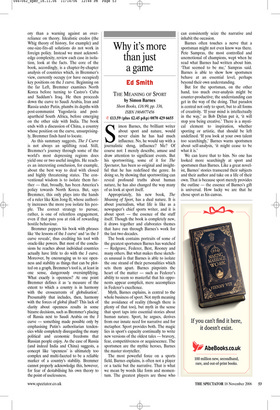Why it’s more than just a game
Ed Smith
THE MEANING OF SPORT by Simon Barnes Short Books, £16.99, pp. 336, ISBN 1904977456 ✆ £13.59 (plus £2.45 p&p) 0870 429 6655 Simon Barnes, the brilliant writer about sport and nature, would never claim he has had much influence. No, he would say with a journalistic shrug, influence? Me? Of course not: I merely describe, amuse and draw attention to significant events. But his sportswriting, some of it for The Spectator, has been so original and insightful that he has redefined the genre. In doing so, by showing that sportswriting can reveal profound truths about human nature, he has also changed the way many of us look at sport itself.
Appropriately, his new book, The Meaning of Sport, has a dual nature. It is about journalism, what life is like as a newspaper’s chief sports writer, and it is about sport — the essence of the stuff itself. Though the book is completely new, it draws together and elaborates themes that have run through Barnes’s work for the last two decades.
The book contains portraits of some of the greatest sportsmen Barnes has watched — Redgrave, Federer, Best, Rooney and many others. But what makes these sketches unusual is that Barnes is able to isolate the one strand of their personalities which sets them apart. Barnes pinpoints the heart of the matter — such as Federer’s ability to seem so masterful that his opponents appear complicit, mere accomplices in Federer’s excellence.
Myth, Barnes explains, is central to the whole business of sport. Not myth meaning the avoidance of reality (though there is plenty of that too), but myth in the sense that sport taps into essential stories about human nature. Sport, he argues, derives from our innate need for narrative and for metaphor. Sport provides both. The magic lies in sport’s capacity continually to write new versions of the oldest tales — bravery, fear, competitiveness or acquiescence. The sportsmen are the mythic heroes, Barnes the master storyteller.
The most powerful force on a sports field, Barnes explains, is often not a player or a tactic but the narrative. That is what we mean by words like form and momentum. The greatest players are those who can consistently seize the narrative and inhabit the occasion.
Barnes often touches a nerve that a sportsman might not even know was there. Pete Sampras, the most controlled and unemotional of champions, wept when he read what Barnes had written about him. ‘That seemed to be me,’ Sampras said. Barnes is able to show how sportsmen behave at an essential level, perhaps beyond their own understanding.
But for the sportsman, on the other hand, too much over-analysis might be counter-productive; the understanding can get in the way of the doing. That paradox is central not only to sport, but to all forms of creativity. ‘If your mind is intellectually in the way,’ as Bob Dylan put it, ‘it will stop you being creative.’ There is a mystical element to inspiration, whether sporting or artistic, that should be left undefined. ‘If you look at your own talent too searchingly,’ Barnes warns sportsmen about self-analysis, ‘it might cease to be what it is.’ We can leave that to him. No one has looked more searchingly at sport and sportsmen than Barnes. Like a great novelist, Barnes’ stories transcend their subjects and their author and take on a life of their own. That is because sport merely provides the outline — the essence of Barnes’s gift is universal. How lucky we are that he chose sport as his canvas.


































































































 Previous page
Previous page